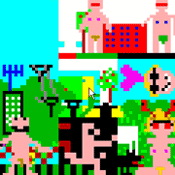webwork 1
THE POIETIC GENERATOR,
by Olivier AUBER (France), 1986-2004…
 The word "generator" suggests life - engendering, creating; something to come, that wasn't there before, a future possibility. In the context of electronic arts, it refers to art works that, thanks to a computer program - coded, hidden writing, invisible yet active - helps produce new content, that will surface and offer itself in response to the visitor's actions. Life, or the impression of life, hinges on this response, a reaction akin to that of human relationships. The random nature of the outcome of this engagement in the generative project reinforces the impression. Something happens, something unexpected and uncontrollable. Chance, and lack of (total) control over the future produce these life-like effects, the outcome of a pact with the computer. Yet, the possibilities are already there, in the subterranean spaces of the computer or network, potential yet unexpressed. In many examples of so-called generative works, the program extracts existing content - written, audio, visual - by means of random mathematical algorithms, from a database, say, or from the Web.
The word "generator" suggests life - engendering, creating; something to come, that wasn't there before, a future possibility. In the context of electronic arts, it refers to art works that, thanks to a computer program - coded, hidden writing, invisible yet active - helps produce new content, that will surface and offer itself in response to the visitor's actions. Life, or the impression of life, hinges on this response, a reaction akin to that of human relationships. The random nature of the outcome of this engagement in the generative project reinforces the impression. Something happens, something unexpected and uncontrollable. Chance, and lack of (total) control over the future produce these life-like effects, the outcome of a pact with the computer. Yet, the possibilities are already there, in the subterranean spaces of the computer or network, potential yet unexpressed. In many examples of so-called generative works, the program extracts existing content - written, audio, visual - by means of random mathematical algorithms, from a database, say, or from the Web.
In Poietic Generator, however, the participants themselves produce the content, in constant reaction to each other's input. A simple drawing tool is made available to users during pre-scheduled sessions. All participants are then present simultaneously on the network to build an image as they see fit. Here, it's not the instrument itself that awakens or reveals the content. The tool obviously serves to trigger group creative acts, but the life infused into the process fundamentally depends on the unpredictable creative reactions of each contributor. The changes constantly being made to the image by one and the other make it an "animation," the real-time manifestation of each individual's contribution magnifying the life-like aspect of the process. To witness one's contribution and others' response while the image develops definitely gives a vivid sense of presence and life. The Poietic Generator, then, is a profoundly human and lively generator, even if participants necessarily transact through a networked tool.
The experience afforded by the Generator is akin to that of a cadavre exquis. Like the latter, it questions the notion of a single author and fosters expressions of the unexpected1. It is also significantly different however, as contributions are not only consecutive (in temporal sequence), but simultaneous as well (spatially disposed). Each contributer is given a space in the image, a fixed number of pixels, depending on the number of participants2. The allotted space becomes his or hers to transform, whether to continue or to break with the contributions of others in adjacent areas. Thus, a community-generated narrative evolves; themes, from the private to the universal, vary from one instance to another.
The Poietic Generator is not the only real-time collective image-creation program - several other similarly oriented projects are worthy of attention3. It stands out in several respects however. One can't help acknowledging the project's incredible longevity and flexibility, having remained active on several networks since 1986. At once a drawing tool, a participative work, a performance, and a telematics project, this endeavour is highly relevant to practices on the network, as it takes into account the very nature of this new space and means of communication. Above all, The Poietic Generator offers participants a presence, to themselves and to others, by giving them the possibility of creating within a shared space and time. In this sense, one comes away from the experience not so much with an impression of life, but with the certainty of taking part in it.
(In French, English and Italian versions)

Notes
1 : Cadavre exquis (from the first words of the first such exercise) is a device for collective creation used by the surrealists. One after another, participants contribute a word or an image to the creation, without knowing what the final outcome might be. 
2 : The more contributors there are the smaller the area given to each, and vice-versa. 
3 : Andy Deck's projects, for instance, form a delightful set of drawing and visual creation tools. See www.andyland.net and artcontext.org. 
Sylvie Parent
(Translated from French by Ron Ross)

 top top
 back back
|
